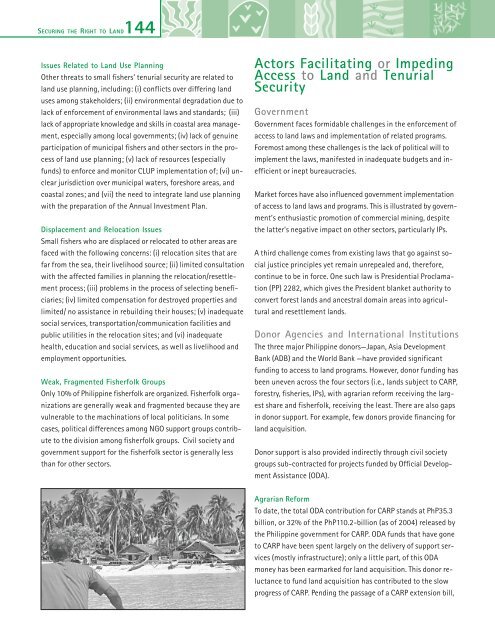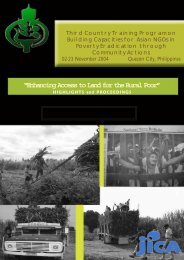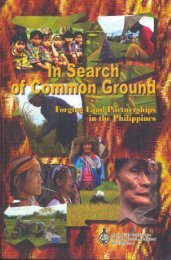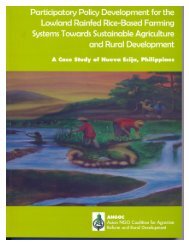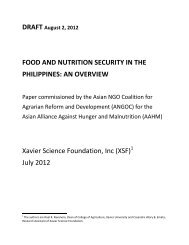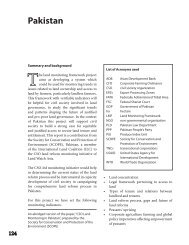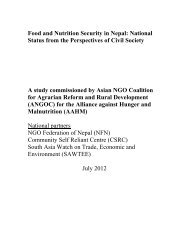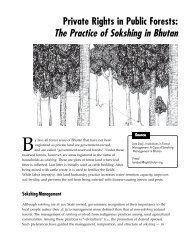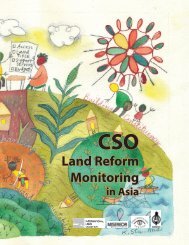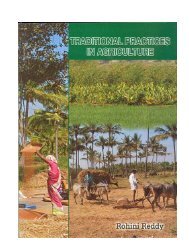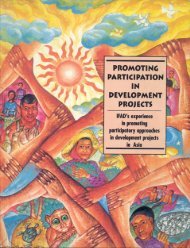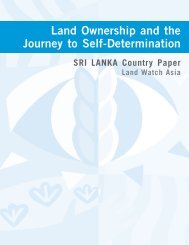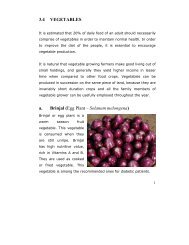Securing the Right to Land FULL - ANGOC
Securing the Right to Land FULL - ANGOC
Securing the Right to Land FULL - ANGOC
Create successful ePaper yourself
Turn your PDF publications into a flip-book with our unique Google optimized e-Paper software.
SECURING THE RIGHT TO LAND144<br />
Issues Related <strong>to</strong> <strong>Land</strong> Use Planning<br />
O<strong>the</strong>r threats <strong>to</strong> small fishers’ tenurial security are related <strong>to</strong><br />
land use planning, including: (i) conflicts over differing land<br />
uses among stakeholders; (ii) environmental degradation due <strong>to</strong><br />
lack of enforcement of environmental laws and standards; (iii)<br />
lack of appropriate knowledge and skills in coastal area management,<br />
especially among local governments; (iv) lack of genuine<br />
participation of municipal fishers and o<strong>the</strong>r sec<strong>to</strong>rs in <strong>the</strong> process<br />
of land use planning; (v) lack of resources (especially<br />
funds) <strong>to</strong> enforce and moni<strong>to</strong>r CLUP implementation of; (vi) unclear<br />
jurisdiction over municipal waters, foreshore areas, and<br />
coastal zones; and (vii) <strong>the</strong> need <strong>to</strong> integrate land use planning<br />
with <strong>the</strong> preparation of <strong>the</strong> Annual Investment Plan.<br />
Displacement and Relocation Issues<br />
Small fishers who are displaced or relocated <strong>to</strong> o<strong>the</strong>r areas are<br />
faced with <strong>the</strong> following concerns: (i) relocation sites that are<br />
far from <strong>the</strong> sea, <strong>the</strong>ir livelihood source; (ii) limited consultation<br />
with <strong>the</strong> affected families in planning <strong>the</strong> relocation/resettlement<br />
process; (iii) problems in <strong>the</strong> process of selecting beneficiaries;<br />
(iv) limited compensation for destroyed properties and<br />
limited/ no assistance in rebuilding <strong>the</strong>ir houses; (v) inadequate<br />
social services, transportation/communication facilities and<br />
public utilities in <strong>the</strong> relocation sites; and (vi) inadequate<br />
health, education and social services, as well as livelihood and<br />
employment opportunities.<br />
Weak, Fragmented Fisherfolk Groups<br />
Only 10% of Philippine fisherfolk are organized. Fisherfolk organizations<br />
are generally weak and fragmented because <strong>the</strong>y are<br />
vulnerable <strong>to</strong> <strong>the</strong> machinations of local politicians. In some<br />
cases, political differences among NGO support groups contribute<br />
<strong>to</strong> <strong>the</strong> division among fisherfolk groups. Civil society and<br />
government support for <strong>the</strong> fisherfolk sec<strong>to</strong>r is generally less<br />
than for o<strong>the</strong>r sec<strong>to</strong>rs.<br />
Ac<strong>to</strong>rs Facilitating or Impeding<br />
Access <strong>to</strong> <strong>Land</strong> and Tenurial<br />
Security<br />
Government<br />
Government faces formidable challenges in <strong>the</strong> enforcement of<br />
access <strong>to</strong> land laws and implementation of related programs.<br />
Foremost among <strong>the</strong>se challenges is <strong>the</strong> lack of political will <strong>to</strong><br />
implement <strong>the</strong> laws, manifested in inadequate budgets and inefficient<br />
or inept bureaucracies.<br />
Market forces have also influenced government implementation<br />
of access <strong>to</strong> land laws and programs. This is illustrated by government’s<br />
enthusiastic promotion of commercial mining, despite<br />
<strong>the</strong> latter’s negative impact on o<strong>the</strong>r sec<strong>to</strong>rs, particularly IPs.<br />
A third challenge comes from existing laws that go against social<br />
justice principles yet remain unrepealed and, <strong>the</strong>refore,<br />
continue <strong>to</strong> be in force. One such law is Presidential Proclamation<br />
(PP) 2282, which gives <strong>the</strong> President blanket authority <strong>to</strong><br />
convert forest lands and ancestral domain areas in<strong>to</strong> agricultural<br />
and resettlement lands.<br />
Donor Agencies and International Institutions<br />
The three major Philippine donors—Japan, Asia Development<br />
Bank (ADB) and <strong>the</strong> World Bank —have provided significant<br />
funding <strong>to</strong> access <strong>to</strong> land programs. However, donor funding has<br />
been uneven across <strong>the</strong> four sec<strong>to</strong>rs (i.e., lands subject <strong>to</strong> CARP,<br />
forestry, fisheries, IPs), with agrarian reform receiving <strong>the</strong> largest<br />
share and fisherfolk, receiving <strong>the</strong> least. There are also gaps<br />
in donor support. For example, few donors provide financing for<br />
land acquisition.<br />
Donor support is also provided indirectly through civil society<br />
groups sub-contracted for projects funded by Official Development<br />
Assistance (ODA).<br />
Agrarian Reform<br />
To date, <strong>the</strong> <strong>to</strong>tal ODA contribution for CARP stands at PhP35.3<br />
billion, or 32% of <strong>the</strong> PhP110.2-billion (as of 2004) released by<br />
<strong>the</strong> Philippine government for CARP. ODA funds that have gone<br />
<strong>to</strong> CARP have been spent largely on <strong>the</strong> delivery of support services<br />
(mostly infrastructure); only a little part, of this ODA<br />
money has been earmarked for land acquisition. This donor reluctance<br />
<strong>to</strong> fund land acquisition has contributed <strong>to</strong> <strong>the</strong> slow<br />
progress of CARP. Pending <strong>the</strong> passage of a CARP extension bill,


